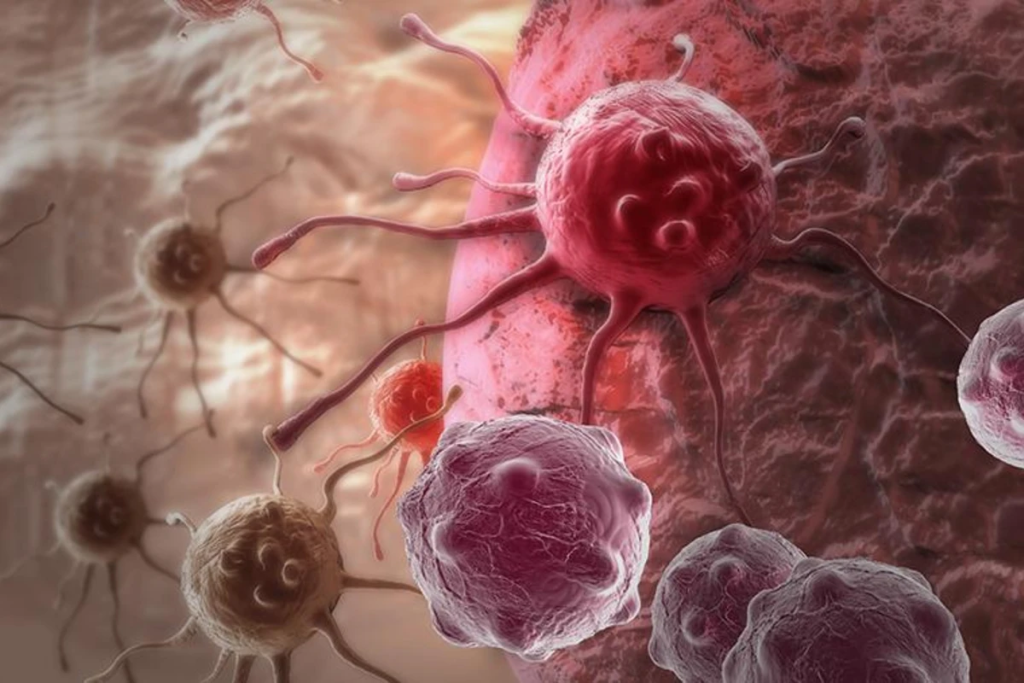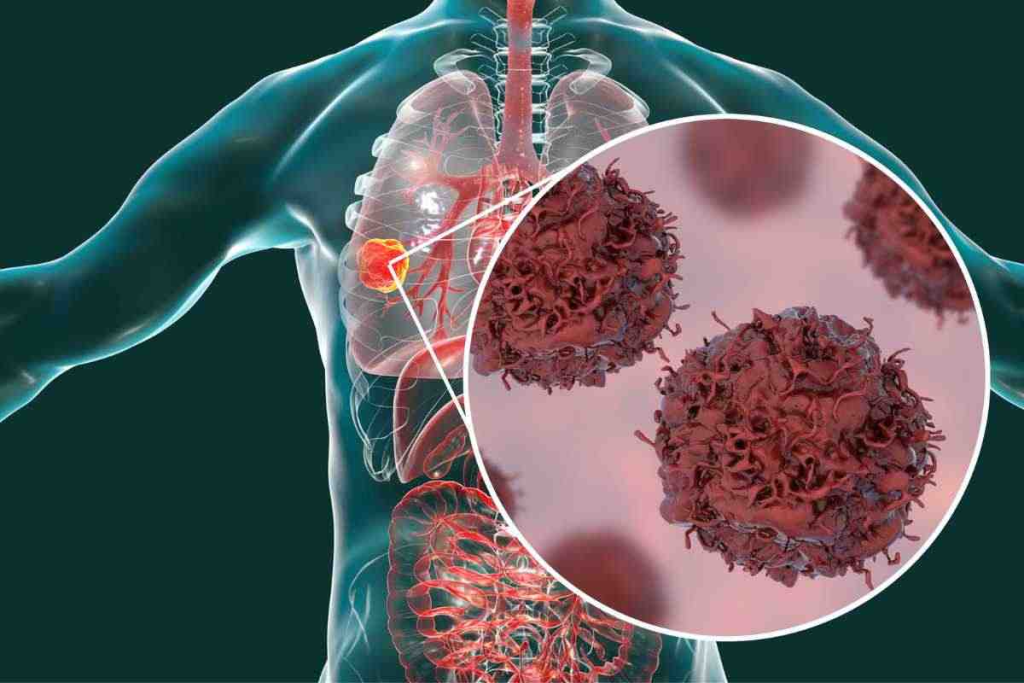Last Updated on October 21, 2025 by mcelik

We list the specific types of cancers where immunotherapy is achieving the highest success and survival rates today.
Immunotherapy has changed the way we fight cancer, giving new hope to many. It uses the body’s immune system to attack cancer cells. This method has been very successful in treating different types of cancer.
Big progress has been made in treating cancers like melanoma, NSCLC, and colorectal cancer. Immunotherapy is now seen as a major. Because of it, patients with these cancers are living longer and doing better.
Immunotherapy is a new way to fight cancer, using the body’s immune system. It’s changing how we treat cancer, helping those who didn’t respond to old treatments.

The immune system keeps us safe from infections and diseases, including cancer. Immunotherapy boosts the immune system’s power to find and kill cancer cells. It does this by making more immune cells or stopping cancer cells from hiding from the immune system.
Immunotherapy also helps protect against cancer coming back. It trains the immune system to attack cancer cells, leading to long-lasting results in some patients.
Unlike chemotherapy and radiation, immunotherapy empowers the immune system to fight cancer. This means it can be more precise, harming fewer healthy cells and causing fewer side effects.
Also, immunotherapy can work with other treatments, giving a multifaceted approach to cancer care. This combination can improve treatment results and offer new hope for patients with different cancers.
Immunotherapy has changed cancer treatment a lot over the years. It started many decades ago. Now, we know a lot more about how the immune system fights cancer.

In the late 19th century, William Coley noticed something interesting. He saw that some patients got better after getting sick after surgery. This led to Coley’s toxins, an early way to boost the immune system against cancer.
Later, big steps were made in immunotherapy. We got cancer vaccines and adoptive T-cell therapy. Then, immune checkpoint inhibitors came along. They help the immune system fight cancer better.
Recently, big discoveries have made immunotherapy even more important. Finding PD-1/PD-L1 and CTLA-4 pathways helped create new treatments. These treatments work well against cancers like melanoma and lung cancer.
Also, CAR T-cell therapy has shown great promise. It’s a personalized treatment for some cancers. These advances show how fast immunotherapy is growing and how key it is in fighting cancer.
Immunotherapy for cancer uses the body’s immune system to fight cancer. It has many forms, each targeting different parts of the disease. This approach is getting better as we learn more about cancer and how our immune system works.
Immune checkpoint inhibitors help the immune system fight cancer better. They block proteins that stop the immune system from attacking too much. This lets the immune system attack cancer cells more effectively.
Examples of immune checkpoint inhibitors include nivolumab and ipilimumab. These drugs have been very effective in treating cancers like melanoma and non-small cell lung cancer.
CAR T-cell therapy changes a patient’s T cells to fight cancer. First, T cells are taken from the patient. Then, they are changed to recognize cancer cells. After that, they are put back into the patient.
CAR T-cell therapy has shown remarkable success in treating certain types of blood cancers, such as acute lymphoblastic leukemia.
Cancer vaccines help the immune system fight cancer. They can be made from cancer cells, proteins, or genetic material. These vaccines aim to make the immune system attack cancer cells.
Examples include sipuleucel-T for prostate cancer. Cancer vaccines are promising for preventing cancer from coming back or treating it.
Monoclonal antibodies are made in the lab to target cancer cells. They can mark cancer cells for destruction or kill them directly. They can also carry drugs or radiation to cancer cells, making treatment more effective.
Rituximab is an example of a monoclonal antibody used to treat certain lymphomas. Monoclonal antibodies are key in cancer treatment, with fewer side effects than traditional chemotherapy.
Knowing about the different immunotherapy types helps patients and doctors choose the best cancer treatment.
Immunotherapy has changed the game in treating melanoma, leading to better survival rates. Melanoma, a serious skin cancer, was once hard to treat. But immunotherapy has made a big difference.
The use of Nivolumab and Ipilimumab together has been a game-changer. Studies show this combo can help 50% of patients with advanced melanoma live longer. This is a big leap forward from old treatments.
Key benefits of this combination therapy include:
Old treatments for melanoma didn’t offer much hope, with lower survival rates. Immunotherapy has brought new hope. The difference between old and new treatments is huge. Immunotherapy has greatly improved melanoma patient outcomes.
The progress in melanoma treatment is a testament to the power of immunotherapy.
Immunotherapy works well for some, but not all. What makes a difference is the patient’s biomarkers and tumor type. Finding the right match is key to effective treatment.
Key predictors include:
Knowing these factors helps doctors tailor treatments. This makes immunotherapy more effective for melanoma patients.
Recent advances in immunotherapy have changed how we treat NSCLC. This has brought new hope to those fighting this common lung cancer. Immunotherapy is now a key part of treating this disease.
Research shows that first-line immunotherapy can extend life by 18.4 months for NSCLC patients. This shows how effective immunotherapy is as a first treatment.
Key benefits of first-line immunotherapy include:
Immunotherapy beats standard chemotherapy in many NSCLC cases. It uses the body’s immune system for a more precise and less harsh treatment.
Comparative studies have highlighted:
Choosing the right biomarkers is key to picking the best immunotherapy for NSCLC patients. Biomarkers like PD-L1 and TMB are vital in making treatment choices.
Key biomarkers include:
By using these biomarkers, doctors can choose the right immunotherapy for patients. This helps improve treatment results.
Immunotherapy has changed how we treat many cancers, including colorectal cancer. This is true for MSI-H/dMMR subtypes. These cancers have high microsatellite instability (MSI-H) or deficient mismatch repair (dMMR). This makes them more likely to respond to immunotherapy.
Pembrolizumab, a checkpoint inhibitor, has shown great results in treating colorectal cancer with MSI-H/dMMR subtypes. Studies have found that 55.3% and 48.3% of patients saw no progression in their disease. This is a big improvement over older treatments.
Pembrolizumab has also had a big impact on how long patients live after treatment. At one year, 98% of patients were alive. At three years, 84% were alive. These numbers show how immunotherapy can change treatment for MSI-H/dMMR colorectal cancer.
Finding the right patients for immunotherapy in colorectal cancer is key. Biomarkers like MSI-H/dMMR status help predict how well a patient will respond. Doctors need to look at tumor characteristics and genetic markers to choose the best treatment for each patient.
By knowing what affects treatment results, we can pick the right patients for immunotherapy. This can lead to better survival rates and quality of life for those with colorectal cancer.
Immunotherapy is making waves in treating various cancers, not just melanoma and lung cancer. Research is pushing the boundaries, making immunotherapy a promising option for many cancers.
Bladder cancer is another area where immunotherapy is showing its strength. Checkpoint inhibitors are helping treat advanced bladder cancer, leading to long-lasting results for some patients.
Renal cell carcinoma (RCC) has seen big strides with immunotherapy. New treatments combining checkpoint inhibitors are now the standard care.
Nivolumab plus ipilimumab has shown better survival rates than sunitinib in untreated patients with advanced RCC.
Hodgkin lymphoma, mainly in relapsed or refractory cases, has seen benefits from immunotherapy. Checkpoint inhibitors like nivolumab and pembrolizumab have shown high response rates.
Head and neck squamous cell carcinoma (HNSCC) is another area where immunotherapy is proving effective. Pembrolizumab and nivolumab have been approved for treating recurrent or metastatic HNSCC.
These agents have shown better survival and response rates than traditional chemotherapy in certain patients.
As we keep exploring immunotherapy’s full range, it’s clear it’s changing cancer treatment. The variety of cancers responding to immunotherapy highlights the need for ongoing research and tailored treatments.
Immunotherapy works differently for everyone. Knowing what makes it work better is key. We’re learning that one treatment doesn’t fit all when it comes to fighting cancer.
Genetic and molecular biomarkers are very important. Biomarkers like PD-L1, tumor mutational burden (TMB), and microsatellite instability (MSI) help predict how well immunotherapy will work. For example, tumors with a lot of PD-L1 might respond well to certain treatments.
Tumors with high TMB or MSI also tend to do better with immunotherapy. This is because they have more targets for the treatment to attack.
The environment around the tumor is also key. This area, called the tumor microenvironment (TME), can either help or hinder the immune system’s fight. Things like immune cells, cytokines, and checkpoint molecules play a big role in how well immunotherapy works.
Tumors with lots of immune cells tend to respond better to treatment. This is because the immune system is already active in these areas.
“The tumor microenvironment is a complex ecosystem that can either hinder or enhance the effectiveness of immunotherapy.”
When treatment starts is also important. Starting early can lead to better results by attacking the tumor sooner. It can also help prevent the tumor from becoming resistant to treatment.
How treatments are ordered can also matter. Some studies show that starting with immunotherapy can lead to longer survival times. This is because it can weaken the tumor before other treatments are used.
By understanding these factors, doctors can create more tailored treatment plans. This helps patients get the most out of immunotherapy.
Multidisciplinary treatment centers lead the way in improving cancer immunotherapy. They have a team of experts from different fields. This team works together to give patients the best care.
These centers are key in cancer immunotherapy. They combine different specialties. This ensures patients get coordinated care that meets their specific needs.
Studies show that high-volume hospitals with teams get better results in cancer treatment. The experience and expertise of the team are key. This comes from treating many patients.
A study on Merkel cell carcinoma found the benefits of teamwork. It showed how different specialties help solve treatment problems.
Integrated care teams in these centers offer many benefits. They include:
This approach ensures patients get the best treatment for their condition.
Multidisciplinary treatment centers often have access to new clinical trials and therapies. This gives patients a chance to try the latest treatments. This is a big plus for those getting cancer immunotherapy.
Thanks to these teams and the resources of high-volume hospitals, patients can see better results. They also get to enjoy a better quality of life.
Cancer immunotherapy is growing, but it faces many hurdles to reach its best. It has shown great promise, but it’s not without its challenges. These issues affect how well it works and who can get it.
One big challenge is dealing with immune-related adverse events (irAEs). These happen when the immune system, boosted by therapy, attacks healthy parts of the body. Symptoms can be mild or severe and affect many areas, like the skin and gut.
To tackle this, we must create personalized treatment plans. We also need to watch patients closely for any signs of irAEs. This way, we can act fast and adjust treatments to avoid serious problems.
Another hurdle is primary and acquired resistance mechanisms. Some people don’t respond to treatment right away (primary resistance). Others might start responding but then stop (acquired resistance). It’s key to understand why this happens to find ways to beat it.
Cost and accessibility barriers also hold back cancer immunotherapy. These treatments can be pricey, keeping them out of reach for many. We need to work on making them more affordable and accessible.
By tackling these challenges, we aim to make cancer immunotherapy better for more people. Our goal is to make it more effective, affordable, and available to those who need it most.
Immunotherapy has changed the game in cancer treatment, bringing hope to people all over the world. It uses the body’s immune system to fight cancer. This approach has shown great promise in treating different cancers, like melanoma, lung cancer, and colorectal cancer.
The results of immunotherapy are clear. Patients are living longer and responding better to treatment. For example, a mix of nivolumab and ipilimumab has helped 50% of melanoma patients survive long-term. Also, pembrolizumab has been very effective in treating colorectal cancer with specific types.
Even though immunotherapy is a big step forward, there are challenges to overcome. We need to deal with side effects, find ways to beat resistance, and make it more affordable. Research and new treatments are key to making cancer care even better.
In short, immunotherapy is a major leap in cancer treatment, bringing better results and hope to patients. As we learn more and improve this method, we’ll see even more breakthroughs in fighting cancer.
Immunotherapy uses the body’s immune system to fight cancer. It boosts the body’s defenses to attack cancer cells. This method is more targeted and less invasive than traditional treatments.
Immunotherapy works well on many cancers. This includes melanoma, lung cancer, and colorectal cancer. It also helps with bladder, kidney, and head and neck cancers.
There are several types of immunotherapy. These include immune checkpoint inhibitors, CAR T-cell therapy, cancer vaccines, and monoclonal antibodies. Each type helps the immune system fight cancer in its own way.
Immune checkpoint inhibitors block proteins that cancer cells use to hide from the immune system. By blocking these proteins, the immune system can better attack cancer cells.
Success with immunotherapy depends on several things. These include genetic markers, the tumor environment, and when treatment starts. Knowing these helps doctors tailor treatments for each patient.
Immunotherapy faces challenges like managing side effects and overcoming resistance. It also has cost and access issues. Researchers are working to solve these problems.
Multidisciplinary centers are key in immunotherapy. They offer a team approach, access to trials, and new therapies. This leads to better treatment results.
Yes, immunotherapy can be combined with other treatments. This includes chemotherapy, radiation, or targeted therapy. The right combination depends on the cancer and the patient.
Biomarkers, like PD-L1 and tumor mutational burden, are vital. They help predict how well a patient will respond to treatment. This information helps doctors choose the best treatment plan.
Immunotherapy research is always advancing. Scientists are exploring new combinations and biomarkers to predict treatment success. These efforts aim to improve cancer treatment even more.
André, T., Shiu, J. M. S., Kim, T. W., Jensen, B. V., Tabernero, J., & Yoshino, T. (2020). Pembrolizumab in microsatellite instability“high and microsatellite stable metastatic colorectal cancer: the KEYNOTE-177 trial. Journal of Clinical Oncology, 38(15_suppl), 4001-4001. https://ascopubs.org/doi/10.1200/JCO.2020.38.15_suppl.4001
Subscribe to our e-newsletter to stay informed about the latest innovations in the world of health and exclusive offers!
WhatsApp us